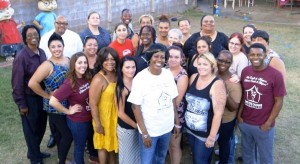 Life isn’t easy for any woman coming out of jail without an ID, family or friends. When they leave jail, they’re going back to the street. There’s nowhere else for them to go. They go into jail homeless and they leave homeless. The only life they know is surviving on the street. No one knows this better than Kim Carter. She spent about 12 years of her life behind bars.
Life isn’t easy for any woman coming out of jail without an ID, family or friends. When they leave jail, they’re going back to the street. There’s nowhere else for them to go. They go into jail homeless and they leave homeless. The only life they know is surviving on the street. No one knows this better than Kim Carter. She spent about 12 years of her life behind bars.
The cycle
Life for Carter seemed to have been mapped out for the rough road from the beginning. “We saw people shooting heroin when we were kids,” recalls Carter. “We played with the needles that they left on the ground. Life was rough for us.”
Carter was already all too familiar with violence and crime early in her life. She had her first drink when she was just five years old and her first hit of cocaine when she was 17. “At that time, I didn’t know that taking that first hit of cocaine would mean that I would lose 12 years of my life,” she recalls.
Carter found herself in and out of prison for the next couple of years. She was homeless and turned to prostitution to survive. It was a never ending cycle of drugs, crime and prison.
Breaking the cycle
“I had many sleepless nights,” says Carter. “It was like God was telling me He had got me through it all for a reason.” Carter applied and was accepted into a program for rehabilitation at her prison. This was the first step on her road to recovery.
“I had my daughter when I was 21 years old. I decided to turn my life around so that I could be with her and help keep her on the straight and narrow. I broke the cycle.”
After being released, Carter founded the Time for Change Foundation in 2002. The foundation helps homeless women and children break the cycle of homelessness, crime and drugs. The foundation provides housing, job training and counseling for the women. Women are reunited with their children.
The foundation has assisted over 800 women since it was founded in 2002. Many of the women assisted by the foundation were formerly incarcerated.
“Many of the women who work at the foundation have been incarcerated previously. They therefore understand the challenges that the women they help face. They help the women navigate these challenges and act as mentors and case managers. They create a safe environment with no judgments for the women they assist.”
